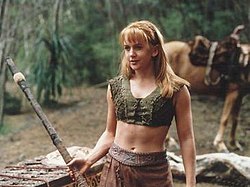The Wall Street Journal and Jezebel take on The "Best Friend", that sad sack hag who stars, or at least supports in most Romantic Comedies.
"The role of the quirky best friend, a rom-com staple that goes back at least as far as Shakespeare, is often a clever narrative device employed by writers to provide exposition and comic relief."
Good News though, the secondary character type seems to be getting more complex.
"After decades of inevitable nuptials and the female leads who are too beautiful and romantical to screw up their climactic hitching, romantic comedies are beginning to relegate their brides to the background while the best friend in all of his or her drunken, self-destructive splendor, takes center-stage and falls headfirst into the wedding cake, pees somewhere inappropriate, or generally makes all those betrothed people feel some mix of pity, envy, and tenderness."The "Best Friend" is an everyman everywoman archetype, the one who we're all supposed to relate to on some level, at least in many Rom Coms: My Best Friend's Wedding, Something Borrowed, Bride Wars, Made of Honor, 27 Dresses, etc... etc... etc...
An outgrowth of the more traditional theatre stereotype seen in Shakespeare in characters like Juliet's Nurse, or countless Ladies Maids in Commedia Dell'Arte, if you're familiar with Mozart's Opera, The Magic Flute, Papageno is "the best friend".
These sidekicks in elaborate long form stories usually find love, often are the comic relief (Think Iolas in Hercules: The Legendary Journeys- yes we're going there) or the voice of conscience or vulnerability for a Hero (Think Gabrielle in Xena: Warrior Princess)
I am a big fan of secondary characters, they are often more interesting to me than the protagonist, who can come off as standard issue heroes and are much easier to predict. The Best Friend often gives life and setting to the universe in an entertainment property. So, in Romantic Comedies of the past two decades, is it surprising that the conflicts of these characters have taken a greater presence on screen as audiences and writers have broader canvases to explore a world? I have often advocated exploring the perspective of secondary characters in narrative extensions across platforms. They are lush and interesting characters with their own motives, pasts, presents, futures and can be really fruitful inspiration.
Romantic Comedies have been structured slapstick stories reprised for centuries with similar characters, journeys and story arcs. It is unsurprising from a historical standpoint that filmed romantic comedies have had similar tendencies. What is exciting however is the way many artists are exploring this genre and breaking up those conventions to reflect the modern era, making stories about older characters, exploring the less explored perspectives of characters in the dramas.
While the bites out of these traditional structures seem minimal and at times unsatisfying different from these tried and true story arcs, every one of them counts. We have the ability to make more stories, create more perspectives and talk about what romantic stories we'd like to see with creators than ever before.
How would you change these stories if you were writing them? What is it you would rather see? Chances are, if you state it, someone will think it's a good idea and make it.



No comments:
Post a Comment